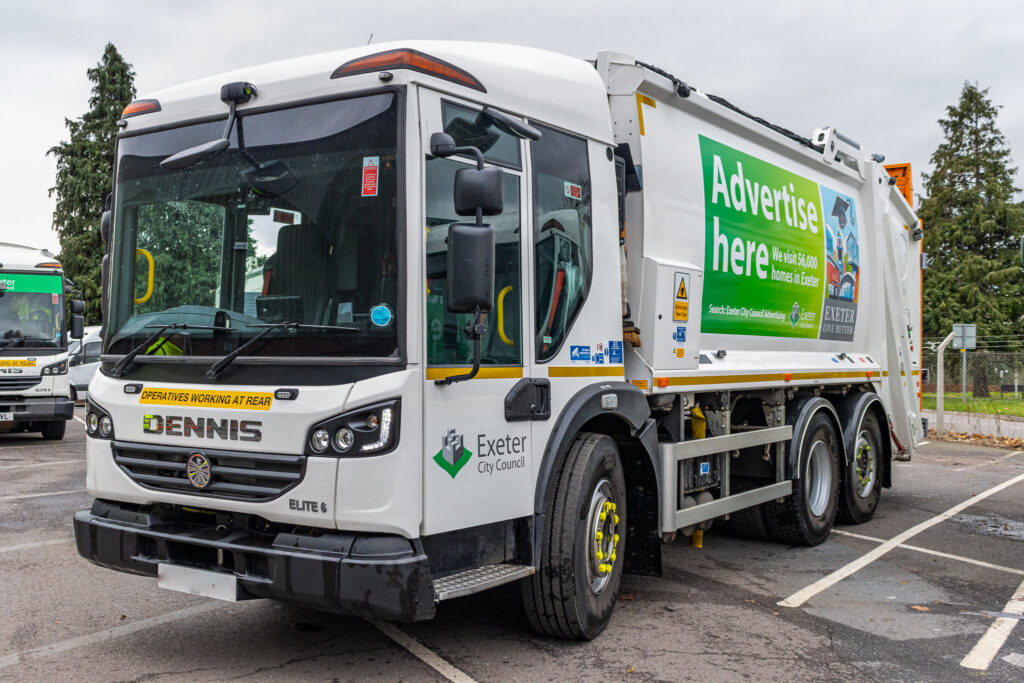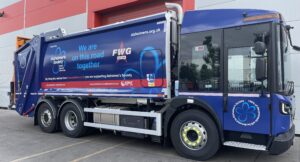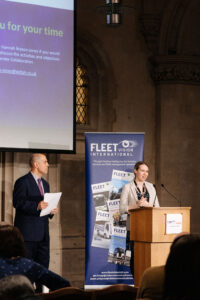As Mid-Devon District Council and Exeter City Council celebrate the first anniversary of their joint project, FVI catches up with Specialist Fleet Services, the contract hire company awarded the seven-year contract to manage, replace and maintain both councils’ fleets.
Specialist Fleet Services (SFS) is a contract hire, municipal fleet and workshop provider with a 30-year track record in vehicle and maintenance provision across the public and private sector in the UK. The company has extensive experience working with local authorities, forming long-standing partnerships with many UK councils. Some local authorities have worked with SFS for more than 20 years.
Managing Director Bob Sweetland believes that the business’s success with councils is down to the additional services and bespoke support that it offers. ‘We are not just a contract hire company. We help our customers optimise their service provision. Value for money is crucial particularly for councils where budgets are typically restricted. We invest time and effort into each contract to ensure it is a success. Put simply, if you deliver what you say you will deliver, customers stick with you.’
The contract for Mid-Devon District Council (MDDC) commenced in June 2019 and went live at Exeter City Council (ECC) a month later. Together, the contracts involve the provision and maintenance of more than 200 vehicles, including refuse and recycling vehicles, sweepers, hook loaders, tippers, vans, cars, telehandlers, and grounds maintenance equipment. The new fleet also includes a number of electric vehicles.
SFS recruited a dedicated contract manager, Jeff Bennett, to help supervise the implementation of the contract, liaise with the councils, and manage third-party maintenance providers. Local suppliers were appointed to look after the road-going vehicles: Trucksmith in Mid-Devon and SHB Hire (now part of Enterprise UK) in Exeter. Masons Kings provides support across both council areas by looking after grounds maintenance equipment.
Jeff Bennett has regular meetings with the councils and maintenance providers to ensure issues are dealt with swiftly.
‘We also closely monitor fleet performance. The age profile of the vehicles is varied, and we prioritise replacing the oldest vehicles. The new vehicles are operating well and the feedback from crews and supervisors about the additional safety equipment is very positive. Regular KPI reports show that things are working well. For example, last month all the O licence vehicles passed first time and we have completed 100% of all scheduled vehicle services.’
In the past, both councils purchased their vehicles outright and this is the first time they have opted for contract hire.
MDDC previously acquired its vehicles exclusively and outsourced maintenance to a number of suppliers, but Stuart Noyce, Group Manager, Street Scene and Open Spaces for MDDC says the new contract is not only better value but also more straightforward to manage.
‘We have a fixed price with no unexpected costs, which is much better for budgeting, and one point of contact for maintenance. There are many additional advantages as a result of the increased harmonisation with Exeter City Council, such as the ability to share equipment, carry out joint training and use each other’s depots to park vehicles.’
‘If you purchase vehicles outright, you are solely responsible for the operational and maintenance costs of running the fleet, including the risk of end-of-life disposal,’ says Bob Sweetland.
‘Vehicle technology is developing so quickly and new regulations regarding emissions, weight restrictions, and safety are being introduced all the time. What will those vehicles be worth in five to ten years’ time? With contract hire, that risk is the responsibility of the fleet provider.’
Simon Hill, Service Manager, Recycling, Waste and Fleet at ECC, says the council compared the cost of contract hire against its previous method of fleet procurement as part of the tender process. ‘This showed that by contract hiring the vehicles with SFS, we expect to make a saving over the lifetime of the vehicles and also speed up the replacement of older vehicles with newer, lower-emission vehicles from year one of the contract.’
Many older vehicles have already been replaced. In Exeter, seven brand new Euro VI 26t Dennis Eagle refuse trucks are in operation, fitted with reverse radar, camera systems, cyclist detection and warning technology, and auto-braking systems.
‘We have ordered replacement vehicles for half of our fleet, which have been received in the first nine months,’ says Simon Hill from ECC. ‘These consist of the latest models with a higher level of emission control and they are fitted with the newest safety technology. SFS has also provided us with more electric vans and cars, so we now have over a dozen electric vehicles on our fleet. In the future, we hope to introduce electric refuse vehicles to the fleet.’
SFS is also assisting ECC with its preparations to introduce a new kerbside sort recycling collection system in September 2021, using its market expertise to advise the council on the best vehicles to operate the service.
‘We haven’t operated kerbside collection vehicles before, so it’s important we get the right vehicles and our crews have the proper training,’ says Simon Hill.
‘The team at SFS is very knowledgeable about the available vehicles and can advise us on the best options.’
ECC’s commercial waste collection service has also benefited from the contract and now has four new bin-weighing equipped vehicles for trade waste collections. The bin-weighing technology enables the service to monitor every bin collected and feed detailed information back to customers.
‘Some customers wanted us to provide data about their waste and recycling and we can now do this,’ says Simon.
‘It is very reliable so the data is accurate, and although we don’t charge for overweight bins, it means that we can talk to customers if their bins are very heavy and offer alternative recycling and waste separation solutions where appropriate.’
In MDDC, the first tranche of new vehicles included four low emission Euro VI 26-tonne Dennis Eagle Elite 6 Narrow refuse vehicles, designed for operation in built-up urban areas as well as narrow access roads. Following a successful trial, MDDC also selected a Kramer KT407 Telehandler due to the performance and drivability of its hydrostatic transmission.
‘The first year has gone well and SFS has successfully delivered in line with the contract,’ says Stuart Noyce from MDDC. ‘The change has achieved all the savings we forecasted, and service users now have one point of contact, which works much better. SFS is always proactive in resolving any issues.’
Simon Hill says ECC is also very happy with the contract. ‘It has accelerated the replacement of our fleet, which is an immediate gain. The support and advice from SFS have been invaluable.’
‘We are very pleased with how things are going,’ says Bob Sweetland. ‘We have continued to support all our customers during lockdown. Deliveries of new vehicles are on schedule and our third-party providers are operating as normal. We also hold monthly strategic review meetings with both councils to maximise the benefits of joint working.’




